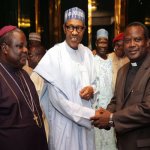PRESIDENT Muhammadu Buhari, on Thursday, said he was alarmed with what he met on ground and almost ran away from Aso Rock soon after he was sworn-in as President.
Buhari said he was scared when the enormity of the country’s economic crisis dawned on him.
He spoke while addressing the Senior Executive Course 38 (2016) of the National Institute for Policy and Strategic Studies (NIPSS), Kuru, Jos at the Council Chamber of the Presidential Villa, Abuja.
The President, who digressed from the prepared speech he was reading, said he was surprised to discover that in spite of the huge oil revenue realised by the past governments, nothing was on ground to show for it.
He said he discovered that the country did not make any investment in infrastructure and other essentials in spite of the huge revenue that accrued to successive governments since 1999.
He said: “Gentlemen, I have to digress now. For 16 years, there was unprecedented revenue realised. The oil projection which can be verified was 2.1 million barrels per day, 1999-2015. The average cost of each Nigeria’s barrel of oil was $100 per barrel.
“When we came, it fell to less than $30 per barrel and is now between 40 and 50 (dollars). Actually, I felt like absconding because 27 out of 36 states in Nigeria cannot pay salaries and we know they have no other source than to depend on salaries.
“And I asked any savings? I was told there was no savings, And I asked, what have you done on agriculture, power, rails, roads?
“Nothing. You know more than I do because you move around. I have not been moving around since after elections but you do. How many of the Trunk A roads are still good enough? How much power do we have, although there are some elements of sabotage.
The President further noted that he was startled when he was informed that the huge revenue from oil was spent by successive governments on importation of food and petrol in the name of subsidy.
He wondered how many Nigerians, apart from the elite class, could afford afford imported food items or even have taste for them that would warrant such expenditure.
“I was told the money was used to import food and fuel. I didn’t believe the answer and I still don’t believe it. Until now substantial number of people in the East eat garri and groundnut; in the West, pounded yam, cassava, vegetables; in the North, tuwo which is made from any of the grains: millet, sorghum. They eat it in the night and warm it in the morning and eat it and take fura da nunu in the afternoon. How many of those people can afford foreign food?
“Then they said I should check out the petroleum sector. The legislature dedicated 445,000 barrels per day and that is just 60 per cent of our requirements. I said ok what of the 40 per cent? The marketers that are bringing it just present documents, papers are just stamped and monies are taken away.
“This is the type of things that the Nigerian elites are doing for our own country. When you go back look at your colleagues and encourage them to be truly Nigerians,” Buhari noted.
President Buhari, however, said he was glad that Course 38 had been able to deliver on his challenge to them to do a report the topic “Strengthening Institutional Mechanism for Poverty Reduction and Inclusive Development”
“have looked forward to receiving this report because it touches on one of the fundamental problems confronting our nation. The Report comes at a time when our economy is experiencing a downturn and all efforts are being made by this administration to get our country moving again,” he said.
He appealed to Nigerians to continue to have abiding faith in his administration in spite of the current hardship in the country, saying he could not afford to ignore the poor who made great sacrifice to bring him into power.
He noted that the economic recession was not the making of this administration, but a consequence of bad management of the economy in the past couple of decades.
He pledged the commitment of his administration to ending extreme poverty in Nigeria.
According to him, even though the current recession was not limited to Nigeria as “there are far, far worse cases than Nigeria” his government is working assiduously towards ensuring that the country comes out of the recession vibrant and strong.
The President maintained that poverty reduction and inclusive development have become pillars of this administration and very close to his heart.
“One year ago, during the Presidential Parley with the Participants of the Senior Executive Course 37 of the National Institute for Policy and Strategic Studies, I saddled the Management of the National Institute with the responsibility of looking at Strengthening Institutional Mechanisms for Poverty Reduction and Inclusive Development in the 2016 Course.
“I am glad that the Participants of the Senior Course 38 took up the challenge and today presented the Report of the Study. I have carefully noted the report, most especially its findings and policy recommendations.
“I recall with pleasure that when I was giving this task, six months after this administration came into office, the selection of the theme was not only apt but also timely. Today, poverty reduction and inclusive development have become pillars of this administration and very close to my heart,” he said.
Buhari said: “In the last one and half years of this administration, the economy has experienced some tough times, particularly with the decline in oil revenues, which has some harsh impacts on Nigerians at the grassroots.
“Whatever the scale of the problem the important thing is how one tackles it. Accordingly, this administration is committed to finding lasting solutions to our economic structural imbalance.
“Let us have faith in our great nation that we will come out of this recession vibrant and strong. I am glad that the report presented today has given us reason to keep faith in our ability to overcome our challenges.
“There is no doubt that poverty for decades has been a major challenge to us as a nation despite the country’s enormous wealth. Several policies and programmes that have been implemented over the years, as rightly observed by the Report, have not broken the cycle of poverty in Nigeria.
“From the findings of the research by the Participants, it is evident that strengthening our institutions is key to reducing poverty and engendering inclusive development.
Presenting the report earlier, the Acting Director General of NIPSS, Jonathan Juma said a lot could be done by the national institute if more robust budgetary support was extended to it.
“For the Institute to operate as an “apex institution” and be at the forefront of relevant researches for national development , it is required to recruit and retain top level academics, very senior technocrats and other experienced specialized experts.
“At the moment, I must confess to you that the national institute is operating below its conceived capacity due to its inability to attract a full complement of requisite staff who would conduct research across broad strategic areas of national life and also impact new knowledge,” he submitted.
WATCH TOP VIDEOS FROM NIGERIAN TRIBUNE TV
- Relationship Hangout: Public vs Private Proposals – Which Truly Wins in Love?
- “No” Is a Complete Sentence: Why You Should Stop Feeling Guilty
- Relationship Hangout: Friendship Talk 2025 – How to Be a Good Friend & Big Questions on Friendship
- Police Overpower Armed Robbers in Ibadan After Fierce Struggle





